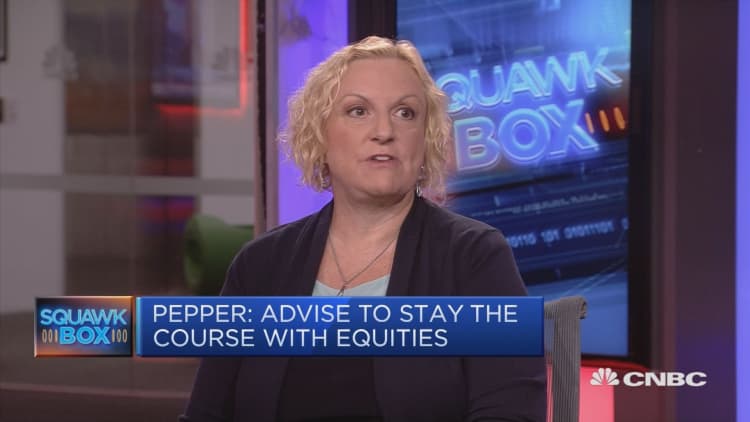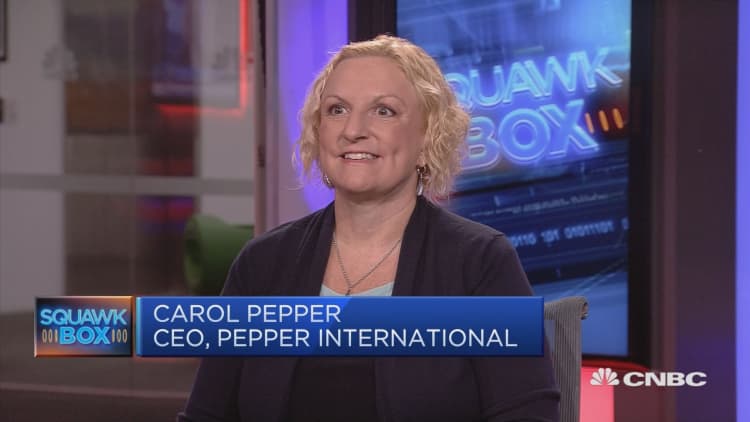
Investors simply need to adjust to the current environment rather than ditch their equity portfolios amid geopolitical concerns and fears of a market correction, a U.S. asset manager told CNBC Wednesday.
With the S&P 500 up nearly 10 percent year-to-date at a time when geopolitics is worrying investors, some money managers have begun considering a market correction. However, Carol Pepper, chief executive officer at Pepper International, believes that stocks have plenty of room to run.
"I think we are mid-way through the game, I don't think we are at the end of the game, and I'll tell you why, because we've had 10 years of a flat market and 10 years is a long time … You could say we have 5, 6 years to run," Pepper told CNBC Wednesday morning.
She projects a small sell-off followed by a quick snapback. "People have been talking about fatigue in the rally since the rally started," she said. "I think stay the course through the end of the year. Yes, we will have a few more dips of course, this North Korea thing is very disturbing, but assuming we don't go to war, somebody doesn't go to war with North Korea, I believe by the end of the year, will be at least this level if not higher," Pepper explained.
Discussing three different reasons for why investors should stick to U.S. equities specifically, she says corporates still have a lot of cash, the country still has little pressure on wages and there's still lots of capital expenditure to be done. "The corporations themselves are much more bullish than the market. Everybody in the market is a 'nervous nelly' and I don't see that in the corporate side … I think we have got more of a run to go," she added.
Markets have seen some negative trading sessions since the escalation of tensions between North Korea and the United States. However, those watching out for a correction mention that China's debt pile and changes in the discourse of central bankers could be the trigger to a sell-off too.
"In our opinion, the highest risk/probability for such a trigger event is still a slowdown in China – not (yet) North Korea or Trump," Lothar Mentel, chief executive officer and chief investment officer at Tatton Investment Management, told CNBC via email Tuesday.

He added that monetary policy is the second highest risk for a market correction. Investors have been working on the assumption that the U.S. Federal Reserve will continue raising interest rates and slowly remove its stimulus. However, such assumptions have recently become less clear cut with investors worrying about the lack of policy delivery by the U.S. administration, which has promised a range of fiscal policies including tax cuts and infrastructure spending that could support the Fed's normalization policy.
Which stocks?
If indeed, investors believe that stocks have still room to offer, the secret is to be adequately allocated. Pepper told CNBC Wednesday: "Stay with your equity positions; be properly allocated so if you're overly afraid to meet that (sell-off) stage you haven't done your allocation properly."
Health care and technology are her top choices as she expects them to continue to outperform this year; but financials should be avoided.
"We have to take long-term positions that are going to work over years and frankly I just don't see it in financials. The Street has been pushing this trade for at least two years … But if you look at what's happening, we're not going to have the interest rate rises that we thought we were going to have. So they're not gonna get the margins, we aren't seeing any easing in regulation, where's the juice in that trade?," she wondered.
Many investment managers said at the start of the year that the financial sector would outperform this year on the basis that central banks are due to lift the stimulus pedal and raise interest rates – thus giving banks a better yield on their investments. They also predicted policy moves by the U.S. administration which would slash key banking regulations. Central banks seem, however, a bit more cautious about the pace for policy normalization and President Donald Trump hasn't yet delivered on these key policy pledges.


